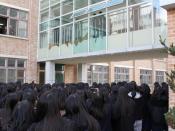"Public outcry has been heard throughout the country in recent years, as an increasing number of states introduce tough new standards and tests for students and schools" (Olson 10). Students and parents in Arizona regularly show their opposition to the Arizona Instrument to Measure Standards (AIMS) test by picketing the Department of Education building in downtown Phoenix. The secrecy surrounding the test prompted The Arizona Republic to sue the state to make the test public. A recent court decision sided with the newspaper citing that the public's right to know outweighs the cost incurred by the state to make new tests each year. The case is currently under appeal. These tougher assessment and accountability systems are having an impact on the schools and on the people in and around them. While standards based assessments are necessary to promote change in public schools, they should not be the only indicators of student or school success.
The standards-based assessment movement seeks to reform schools by requiring students to pass a test on a given set of standards as criteria for graduation. The premise is that if all schools are held accountable to the same set of standards then each state can assure the public that all schools are academically equal regardless of their socio-economic makeup. The November 3, 1999, Education Week article, "The Quiet Revolution in Achievement" lists 15 schools in Colorado with large populations of high-poverty students who also have high reading scores. This evidence seems to shoot down the long held theory that there is a correlation between socio-economic status and school success. Similar results have been achieved in Brazosport, Texas, where although "forty-one percent of its students are economically disadvantaged...there are virtually no differences between the achievement of the poorest and most affluent schools in the district" (Schmoker 32).



Great essay
this is a great essay and it was exactly what i was looking for. parts of it as hard to understand but i got most of it
1 out of 1 people found this comment useful.